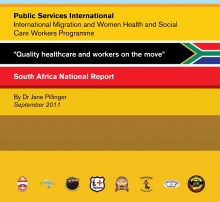Migration: South Africa National Report

This report documents innovative participatory research carried out in South Africa by PSI affiliated trade unions under the PSI’s Programme on Women and International Migration in the Health and Social Care Sectors.
The following eight unions affiliated to the PSI participated in the research:
- Democratic Nursing Organisation of South Africa (DENOSA, 70,174 members)
- National Education, Health and Allied Workers Union (NEHAWU, 180,516 members)
- National Public Service Workers Union (NPSWU, 7,142 members)
- National Union of Public Service and Allied Workers (NUPSAW, 24,999 members)
- Police and Prison Civil Rights Union (POPCRU, 104,969 members)
- Health and other service Personnel Trade Union of South Africa HOSPERSA (46,171 members)
- South African Municipal Workers Union (SAMWU, 135,679 members)
- South African Democratic Nurses Union (SADNU, 9,000 members)
The research gives voice to the experiences and needs of health and social care workers. It provides first-hand evidence to support trade union advocacy on behalf of health and social care workers. This report on the situation in South Africa is part of a global research project being carried out by PSI affiliates in South Africa, Kenya, Ghana and the Philippines, and in other origin and destination countries around the world.
The migration of health and social care workers from South Africa must be considered in the broader context of the human right to health and decent work, ethical migration and recruitment processes,global human resources for health (HRH) and the health related Millennium Development Goals (MDGs) established by the United Nations. The research suggests ways in which trade unions,employers and the government can work together to ensure that South Africa manages migration so that it benefits from a ‘brain gain.’ Equally important,the report points to how informed migration choices, and better investment in healthcare, can help retain valuable health workers, create high quality healthcare services and improve working conditions. This is particularly important, as South Africa is a country of significant outward and inward migration.
South African health and social care workers have migrated to more than 44 countries across the world. Global inequalities in economic and social development and a high rate of international migration have left the healthcare system in South Africa stripped of staff and resources. The economic and social costs of losing trained staff to international migration are enormous. This broader context must be addressed if South Africa is to retain its health workers, many of whom migrate to have decent pay and working conditions. While migration is a human right and a choice for many health and social care workers, it is essential that workers who migrate do so within a positive migration policy framework, with information and support, decent working conditions,
opportunities to gain skills and knowledge, and to reintegrate back into the workplace when they return to South Africa.
Our research shows that the majority of health and social care workers want to live in and contribute to the health, well-being and development of their own country. A working environment that is rewarding, where workers are valued, that is safe and stress free, and that provides satisfying work and opportunities for career development will avoid putting workers in a position where they feel they have little choice but to migrate.
The healthcare system in South Africa faces a human resources crisis, resulting from a significant "brain drain", staffing shortages and an under-funded healthcare system. There are not enough healthcare workers to meet the needs of the population, particularly in rural and disadvantaged areas. At the same time, developed countries have an increasing demand for health and social care staff resulting from the care needs of an ageing population.

